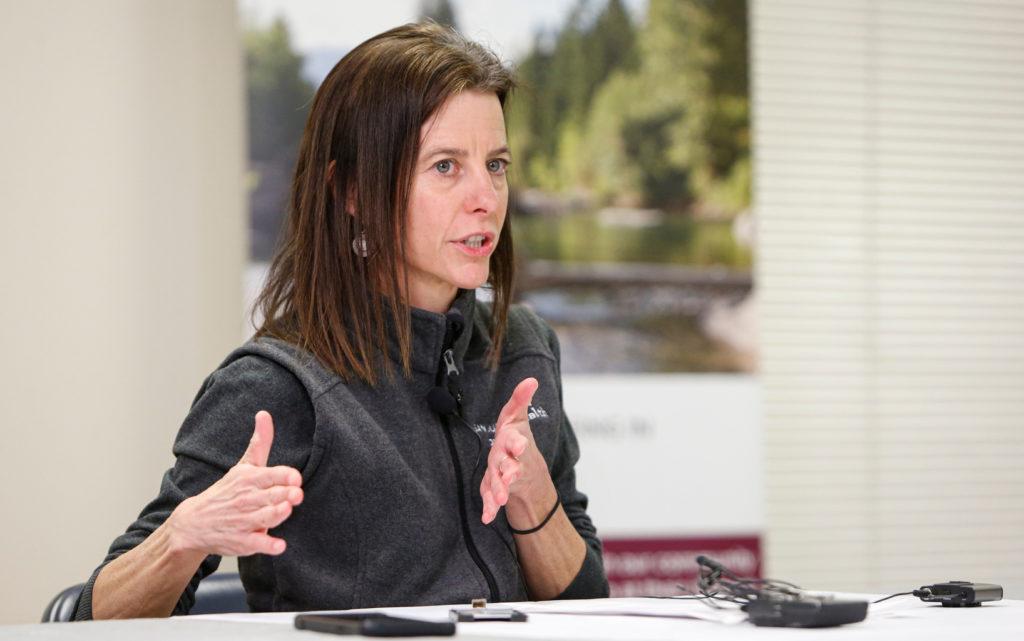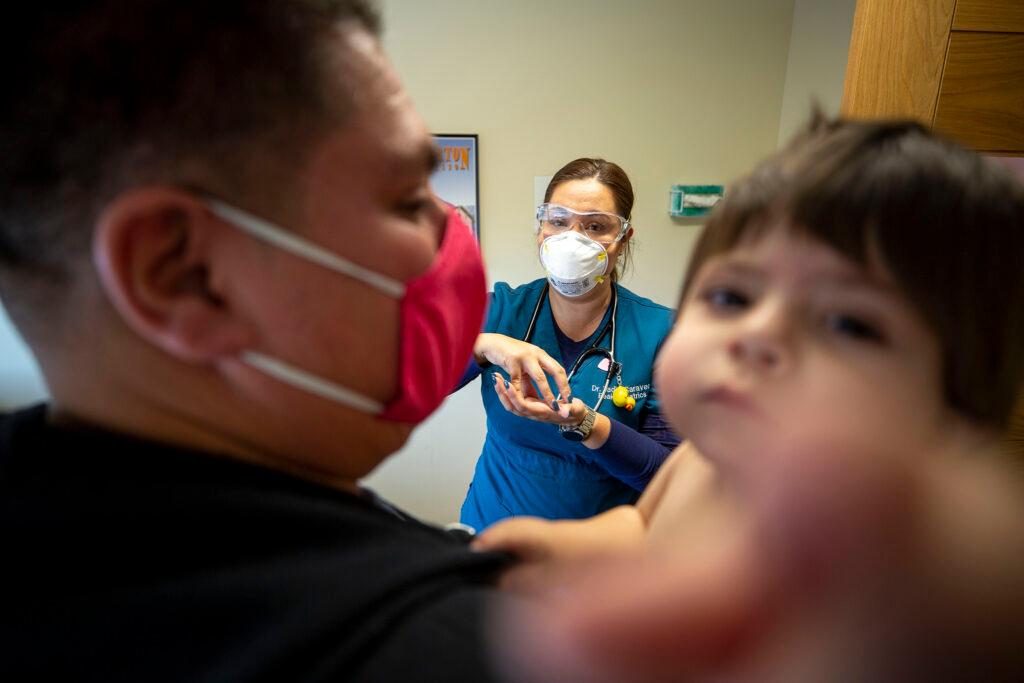
It had been another week of constant work, no sleep and feeling beaten down by the job when Meagan Hillman decided to take a break from her duties as public health director for two rural Colorado counties to do what she was trained to do but rarely can when bogged down in bureaucratic chores: take care of patients.
In late December, right before the holidays, counties had just begun vaccinating their most vulnerable residents. So Hillman, who’s trained as a physician assistant, went with other health care workers to a local nursing home to help inject COVID-19 vaccines to staff and residents.
“We were crying, like happy crying,” she said. “It's so nice to be able to do something that is appreciated.”
For Hillman, who heads up the public health departments in Prowers and Kiowa counties on the Eastern Plains, those were a couple of the good days interspersed with a lot of tough ones since the unruly coronavirus reared its head in Colorado in March.
Public health directors like Hillman are exhausted after working around the clock, trying to manage departments dealing with an unprecedented crisis. At the same time, they’re working with razor thin budgets after years of cuts and fielding criticism from citizens about mask requirements and other restrictions.
They get screamed at in public, threatened by email and, now, even picketed at home.
They have had enough.
More than 20 Colorado health leaders have quit, been fired or are set to leave in coming weeks as the public health response to the pandemic continues to fray nerves. It's part of a nationwide trend, and the possibility for violence has gotten the attention of Colorado legislators.

Frightened And Fed Up
Liane Jollon of San Juan Basin Public Health was on a Zoom call with local officials about COVID-19 earlier this month when she heard a loud banging outside her home in Durango.
“I went to my window and there was an individual standing about ... five to six feet from my front door with a huge sign that said ‘end the lockdown,” Jollon said. “He was yelling ‘a bad person lives here.’”
The man was accompanied by about 20 people who were protesting restrictions like mask-wearing and limits on indoor dining in restaurants, which are aimed at slowing the spread of COVID-19.
Jollon told the officials on the call what was happening and hung up to call the chief of police, who sent officers to her house. She said the group left after a couple of hours and no one was arrested.
Jollon had faced threats before from both sides in her community — those who thought the restrictions were too harsh and others who thought they didn’t go far enough, but this was different.
“It ... completely caught me off guard. It was really just disconcerting,” she said.
Jollon said she felt sorry for her neighbors who had to endure the protests and the noise. She said if she didn’t impose restrictions to try to limit the spread of COVID-19, she’d be negligent in her job.
“I don't love being in this pandemic any more than anybody else. I don't love wearing masks. I miss seeing my friends and family, I miss going over to people's houses. I miss hugging people. I miss eating at restaurants, but this is my job,” Jollon said.
That job continues to make her a target. A smaller group of protesters returned on Jan. 24. They yelled towards her house while they stood across the street.
Joni Reynolds, who heads the Gunnison County Department of Health, as well as the local department of human services, says she’s received angry phone calls, letters, cryptic notes and has been the subject of social media conversations where participants debated “whether they should have a protest at my house or whether they should hang me from a branch of justice.”
The police in Gunnison County, in the central part of the state, have been monitoring those missives since April and have been tracking Reynolds’ whereabouts when she travels.
She says many public health directors across Colorado are scared.
“They've talked about even situations where they've set it up so that they don't have their back to a window because … of the threats that have been made against them,” Reynolds said.
Beyond local officials, state officials have also been subjected to pressure from anti-mask activists. Sarah Tuneberg, an expert in emergency public health response who helped manage the state’s COVID-19 program, learned over the holidays that her address had been posted online by activists who sought to intimidate her.

A Legislative Fix?
It’s an issue state lawmakers plan to tackle when the legislature returns on Feb. 16. Democratic state Rep. Yadira Caraveo of Thornton will be one of the main sponsors of a bill that seeks to protect the private personal information of state and county health care workers.
It would give them the ability to remove their personal information from public internet records. Things like their name, image, email, physical address, disclosing that information would be a misdemeanor.
“So if a public health official is doxed and their information is made public,” said Caraveo, who is also a pediatrician and the legislature’s only medical doctor.
She said she became worried when she learned about health care workers facing threats to their homes, families, and even pets and then leaving their positions.
“And so in the middle of a pandemic, it's really concerning to lose that expertise and to lose that knowledge because these individuals aren't allowed to do their jobs safely and to the best of their capabilities, because they're having to worry about if somebody is going to target their family or themselves just because they're trying to protect public safety,” Caraveo said.
Democrats hold a majority in both legislative chambers and the proposal has Republican sponsors in the House and the Senate. Caraveo said the bill is modeled after protections that already exist in state law for some members of law enforcement and people who work in child protective services.
“I think a lot of us understand the need. I have not heard of any opposition so far.”
While Caraveo says the idea for her bill came specifically out of the pandemic, last year the legislature grappled with whether existing law adequately protects lawmakers from threats and harassment.
Last year’s measure touched on free speech, the role of public officials and the increasingly hostile atmosphere and intimidation many lawmakers say they experience.
Ultimately the bipartisan sponsors of that bill withdrew it after hearing concerns from members in both parties about making the punishment for threatening a state lawmaker a felony, similar to what it is for a judge. Right now it’s a misdemeanor. Some lawmakers say they may consider trying to address that issue again this year.
It's not clear if other legislation would expand beyond public health workers to also include other groups who have faced threats and harassment, such as election workers.
A National Concern
The protests and threats aren’t limited to Colorado. Public health workers across the country said the situation reflects the partisan divisions across the country that came to a head during the insurrection on Jan. 6 at the nation’s Capitol.
“It doesn't really matter whether it's a red or a blue state or county, whether it's rural, urban, suburban, metropolitan,” said Lori Freeman, CEO of the National Association of County and City Health Workers, based in Washington, D.C. “Our local health officials have been experiencing harassment throughout the pandemic for any number of reasons.”
Freeman’s aha moment came last March, when the pandemic was starting to blow up around the U.S. Within the span of a few weeks, three members of her board, including one from Colorado, resigned from their jobs. One had been butting heads with elected officials, another retired early, another had been fired. Freeman began tracking the departures, as well as threats, including death threats, intimidation and firings of local public health officials. To date, her group is aware of 180 such cases around the nation.
“The more I started to look, the more disturbed I was,” she said. “It’s a hard job to be in right now.”
Her group has been keeping a spreadsheet of departures; so far more than 80 public health officials nationally have resigned or been fired since the start of the pandemic. And that is likely an undercount. The association of Colorado’s local public health officials says 17 local Colorado public health officials have already left their jobs since March, and another four are expected to soon.
Freeman has deep concerns about trying to corral the health crisis as all those seasoned health leaders head for the exits, just as a massive national vaccine push ramps up.
“We won't really be able to replace the leadership that we're losing at this rapid pace,” she said.
Many may leave the field altogether, and the impact will likely come in lives lost or devastated by the pandemic.
“We don't have a strong bench to replace them easily,” Freeman said.








